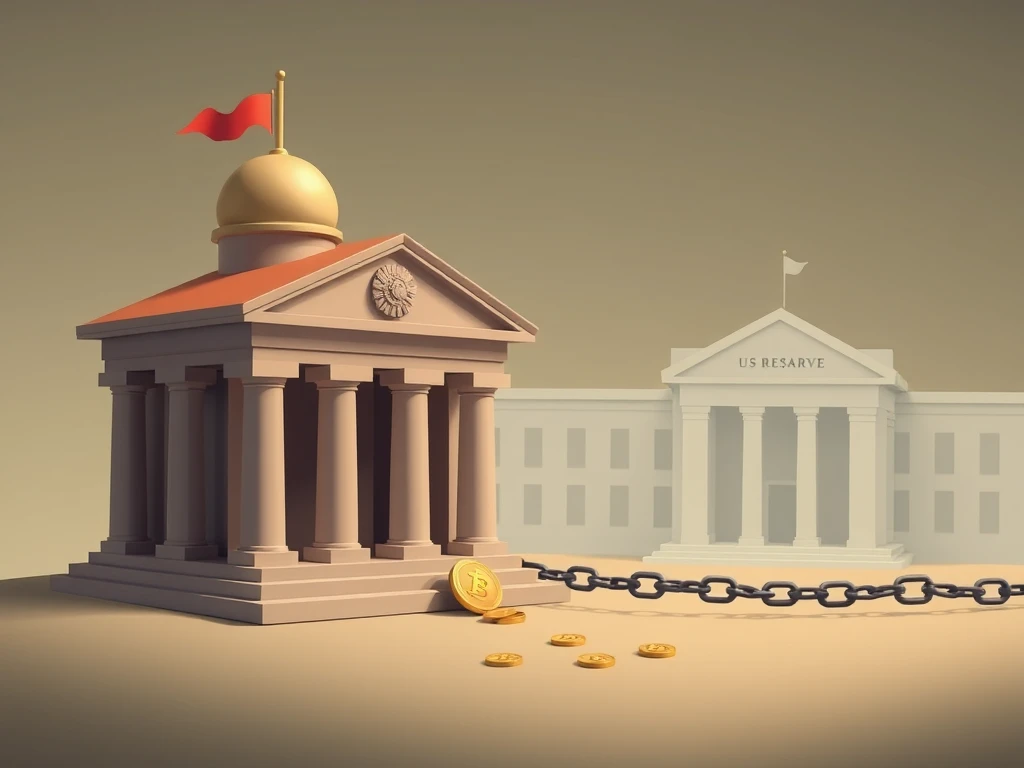Major Relief: Fed Crypto Regulation Eases ‘Reputational Risk’ Scrutiny

Access to traditional banking services has been a significant hurdle for many cryptocurrency and digital asset businesses. This challenge became particularly acute during what was dubbed ‘Operation Chokepoint 2.0’, following the collapse of several crypto-friendly banks in 2023. Over 30 technology and crypto firms reportedly faced denial of essential banking services in the US during this period. Now, a key change from the US Federal Reserve signals potential relief for the sector, specifically targeting the use of ‘reputational risk’ in bank oversight.
Understanding ‘Reputational Risk’ in US Banking Regulations
For years, the crypto industry argued that banks were using the concept of ‘reputational risk’ as a broad brush to avoid serving legitimate crypto businesses. This risk, defined by the Federal Reserve as the potential for negative publicity (true or false) to harm a bank’s customer base, trigger litigation, or reduce revenue, often led banks to simply decline relationships with entire sectors deemed controversial, including crypto. Critics contended this practice amounted to a de facto exclusion of crypto firms from the traditional financial system, a situation exacerbated under the perceived pressures of Operation Chokepoint 2.0.
The Federal Reserve’s Policy Shift
In a recent announcement, the Federal Reserve Board stated it has directed its supervisors to stop considering ‘reputational risk’ as a standalone factor in their oversight of banks. Instead, the focus will shift to more specific and tangible forms of financial risk. The Fed plans to review and remove references to reputation from its supervisory materials, replacing them with clearer guidelines on financial risks. This change aims to make the supervisory process more transparent and consistent. Training will be provided to examiners to ensure uniform implementation across banks under the Fed’s jurisdiction, with collaboration planned with other federal bank regulatory agencies.
What This Means for Crypto Banking Access
This policy adjustment is largely seen as a positive step for crypto firms seeking access to banking services. Senator Cynthia Lummis commented that aggressive reputation risk policies had previously ‘assassinated American Bitcoin & digital asset businesses’, calling the Fed’s move a ‘win’, though noting more work is needed. Rob Nichols, President and CEO of the American Bankers Association, also praised the decision, emphasizing that banks should base business decisions on prudent risk management and market forces, not individual regulatory perspectives.
Does This Eliminate All Risk Scrutiny?
Importantly, the Federal Reserve’s change does not mean banks are free from risk management. The Board still expects banks to maintain strong practices and comply with all laws and regulations. The shift is specifically about how *supervisors* use the concept of reputational risk in their oversight, not how banks might use it internally in their own risk assessments. Banks will still need to evaluate the risks associated with specific clients or business models, focusing now more explicitly on financial, operational, and compliance risks rather than nebulous reputational concerns.
Broader Trend in US Banking Regulations?
The Fed’s move follows other instances of US regulators clarifying or winding back restrictions related to crypto activities. The Office of the Comptroller of the Currency (OCC) confirmed earlier this year that banks can trade crypto for customers and outsource certain crypto activities. Similarly, the Federal Deposit Insurance Corporation (FDIC) indicated that institutions under its oversight can engage in crypto-related activities without requiring prior approval, provided they comply with existing regulations. These developments, including the shift on reputational risk, suggest a cautious but potentially opening stance from US banking regulators towards the digital asset space, moving towards clearer guidelines rather than broad deterrents like those perceived during Operation Chokepoint 2.0.
Summary: A Step Towards Clearer Banking for Crypto
The Federal Reserve’s decision to remove ‘reputational risk’ as a supervisory consideration is a significant development for the crypto industry’s access to banking services in the US. While banks must still manage risks, this change aims to prevent the blanket denial of services based solely on perceived reputational concerns, a practice widely criticized as part of ‘Operation Chokepoint 2.0’. Coupled with clarifications from other agencies, this adjustment in US banking regulations represents a move towards a more defined and potentially less restrictive environment for crypto banking relationships, offering major relief and a clearer path forward for digital asset businesses navigating the traditional financial system.









